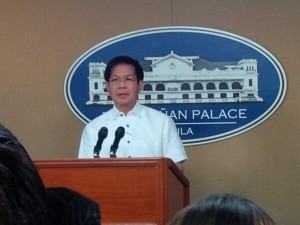MANILA, Philippines – Malacañang said President Benigno Aquino III has not taken action, as of Monday, on Secretary Panfilo Lacson’s “irrevocable resignation” as the President’s point man on the rehabilitation of areas damaged by Super Typhoon “Yolanda” (Haiyan) in 2013.
Communications Secretary Herminio Coloma Jr. said President Aquino accepted last Friday Lacson’s proposal to place his office’s functions to the National Disaster Risk Reduction and Management Council.
“No action has been taken on Secretary Lacson’s ‘irrevocable resignation,’” Coloma said in a statement.
“What has been transmitted to the Office of the President is a review of the work done by the Office of the Presidential Assistant on Recovery and Rehabilitation (OPARR) and its proposal to bring about a transition whereby its present functions will be ‘folded in’ and absorbed by a permanent institution such as the NDRRMC.”
Coloma said the proposal would likely be presented before different Cabinet departments “directly involved or are also stakeholders” in rehabilitation and recovery efforts.
“Their inputs would be gathered and there would be a meeting to come up with a comprehensive view on the matter,” he told reporters.
“As this transition proposal concerns vital policy, it will likely be discussed by the concerned Cabinet members with the President,” he added.
Lacson earlier submitted an 8,000-page rehabilitation and recovery plan for provinces destroyed by “Yolanda,” which also killed more than 6,000 people in November 2013.
He described it as “unprecedented,” claiming no such plan had been submitted before elsewhere in the world.
“I know the world is still watching us—how we will perform, how we will implement the projects. All the clusters of the United Nations are focused on it,” he told reporters last August.
In a statement last week, Lacson called for “a permanent agency” to “handle all functions related to preparedness, recovery and rehabilitation since we are a typhoon-prone country.”
“If we can institutionalize the lessons we learned from Yolanda and have that in a permanent government agency, that would be good for the whole country,” he said.
